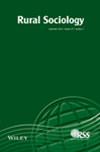犹他州希伯市居民对未来申奥的看法*
IF 1.9
3区 社会学
Q2 SOCIOLOGY
引用次数: 0
摘要
这项研究旨在调查犹他州希伯(Heber)居民对未来申办冬奥会的支持程度。希伯是一个距离盐湖城(Salt Lake City)约45英里的新兴农村社区。具体来说,我们研究了一个人对社区的感受和对盐湖城举办2002年冬奥会的感受如何预测对未来奥运会申办的支持。为了调查我们的研究问题,我们使用了2012年和2018年在希伯谷收集的数据。我们发现,社区依恋、社区满意度和社区感知的可取性显著地预测了对未来申奥的支持。与2012年的基准年相比,2018年的情况有很大不同,这表明自2002年奥运会以来,随着时间的推移,对未来申办的支持有所减少。居住时间、就业状况和士兵山谷设施的使用情况也是对未来申办奥运会的支持程度的重要预测因素。当按希伯谷内的社区(即希伯市、中途岛市或其他城镇的居民)分离观察结果时,自变量之间存在轻微差异。本文章由计算机程序翻译,如有差异,请以英文原文为准。
Residents' Perceptions of a Future Olympic Bid in Heber, Utah*
This study seeks to investigate residents' support for a future Winter Olympic host bid in Heber, Utah, a growing rural community about 45 miles from Salt Lake City. Specifically, we examine how feelings toward one's community and feelings toward Salt Lake City's hosting of the 2002 Winter Olympics predict support for a future Olympic bid. In order to investigate our research question, we use data collected in Heber Valley in 2012 and 2018. We find that community attachment, community satisfaction, and the community's perceived desirability significantly predict support for a future Olympic bid. Compared to the baseline year of 2012, 2018 was significantly different, indicating that support for a future bid has decreased as time has passed since the 2002 Olympic Games. Length of residence, employment status, and use of the Soldier Hollow facilities were also significant predictors of support for a future Olympic bid. There were slight variations among the independent variables when separating the observations by community within Heber Valley (i.e., among residents of the city of Heber, Midway, or other towns).
求助全文
通过发布文献求助,成功后即可免费获取论文全文。
去求助
来源期刊

RURAL SOCIOLOGY
SOCIOLOGY-
CiteScore
4.60
自引率
13.00%
发文量
47
期刊介绍:
A forum for cutting-edge research, Rural Sociology explores sociological and interdisciplinary approaches to emerging social issues and new approaches to recurring social issues affecting rural people and places. The journal is particularly interested in advancing sociological theory and welcomes the use of a wide range of social science methodologies. Manuscripts that use a sociological perspective to address the effects of local and global systems on rural people and places, rural community revitalization, rural demographic changes, rural poverty, natural resource allocations, the environment, food and agricultural systems, and related topics from all regions of the world are welcome. Rural Sociology also accepts papers that significantly advance the measurement of key sociological concepts or provide well-documented critical analysis of one or more theories as these measures and analyses are related to rural sociology.
 求助内容:
求助内容: 应助结果提醒方式:
应助结果提醒方式:


